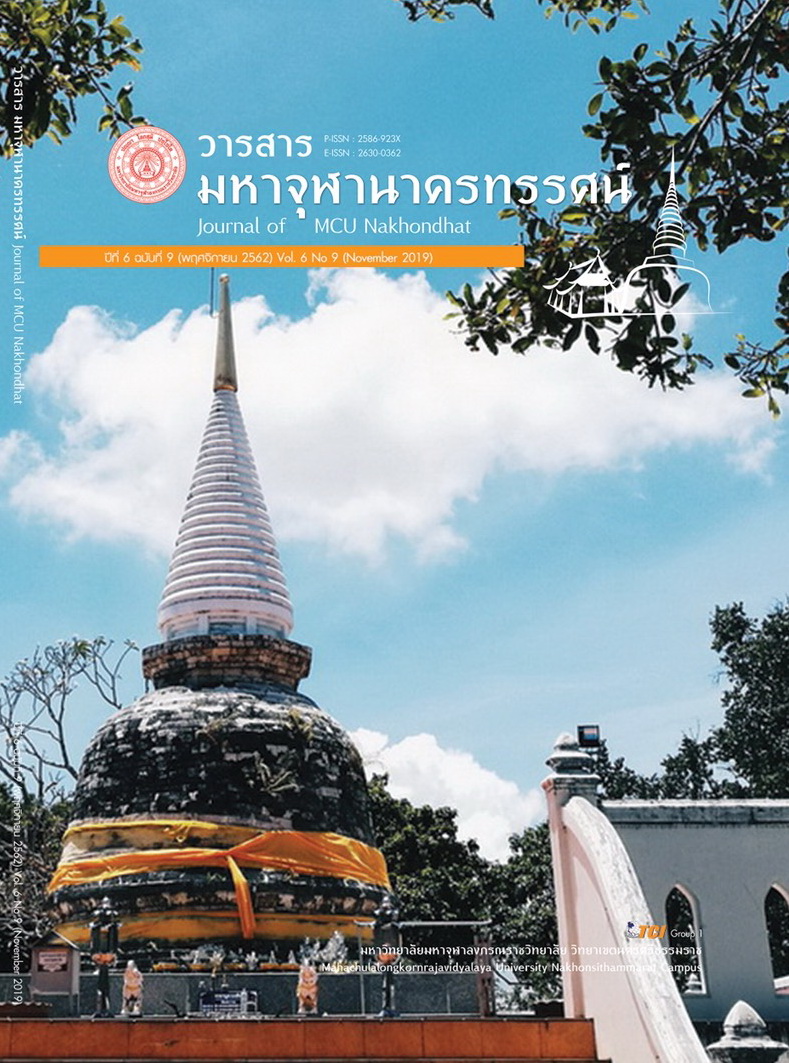A STUDY OF SUFFERING AND THE CESSATION OF SUFFERING IN THE DHAMMAPADA COMMENTARY
Main Article Content
Abstract
The result of research found that Dukkha is a state of being unbearable, unpleasant, physically and mentally oppressed. It is the nature of all things which cannot last in the same condition forever, because they are impermanent and non-self, they depend upon other factors in the form of continuous flowing stream. The attachment in Five Aggregates, therefore; is the cause of suffering that is divided into two kinds; physical suffering and mental suffering. Buddhism focuses on the latter as the origin of all sufferings, namely; Tanha (craving or thirst) caused by Avijja (ignorance or delusion).To eliminate Dukkha, one has to expel the thirst through the Noble Eightfold Path that are summarized into Trisikkha; Sila (Precepts), Samadhi (Concentration) and Panna (Wisdom).
The Explanation of teaching about Dukkha in the scripture of Dhammapada Commentary through the stories of several persons such as the Buddha and his disciples; Bhikkhu, Bhikkhuni, Upasaka, Upasika and general people both in the present and previous existence that shows the process of Dukkha, the origin of Dukkha, the cessation of Dukkha and the path leading to cessation of Dukkha, including the way of life leading to the cessation of suffering through the process of suffering and the extinction of suffering. In Dhammapada Commentary, The suffering is the suffering physically. There is a strong body Is associated with a better environment (municipal reform) have value to life is to be happy and have been invaluable in the development of life. To increase the precept or precepts of virtue is to hold its own well. A supportive environment in which they have helped to create conducive to maintaining a good life together. As a basis for developing concentration and wisdom by putting the rules and regulations to control behavior. Promote common good. Create opportunities for good deeds How mental suffering Buddhist principles that focus on the mind as well. Which is mentioned in the Noble Truths focused on resolving mental pain when suffering is ignorance because there is a desire to stop suffering a prejudiced ignorance, prejudice, passion, developing concentration and wisdom. Which has trained physically and verbally by the sacrament is fundamental. Contribute to the development of the mind with meditation, ultimately leading to the development of intelligence. The scripture of Dhammapada Commentary, therefore; is suitable for studying which mentions suffering with exposition in terms of persons. This can help people to understand the teaching of Dukkha easily and to attain further supreme bliss.
Article Details
References
พระธรรมปิฎก (ป.อ. ปยุตฺโต). (2545). พจนานุกรมพุทธศาสตร์ฉบับประมวลธรรม. (พิมพ์ครั้งที่ 10). กรุงเทพมหานคร: บริษัทสื่อตะวัน จำกัด.
พระธรรมปิฎก (ป.อ. ปยุตฺโต). (2548). จะพัฒนาคนกันอยางไร ? (พิมพ์ครั้งที่ 7). กรุงเทพมหานคร: สำนักพิมพ์สุขภาพใจ.
พระพุทธโฆสเถระ. (2548). คัมภีรวิสุทธิมรรค แปลและเรียบเรียงโดย สมเด็จพระพุฒาจารย์ (อาจ อาสภมหาเถร). (พิมพ์ครั้งที่ 6). กรุงเทพมหานคร: บริษัท ธนาเพรส จำกัด.
พระมหาเกษม สญฺญโต (ลักษณะวิลาศ). (2534). การศึกษาเชิงวิเคราะห์เรื่องทุกข์ในพระพุทธศาสนา. ใน วิทยานิพนธ์ศาสนศาสตรมหาบัณฑิต. สาขาวิชาพระพุทธศาสนา. มหามกุฎราชวิทยาลัย.
พระมหาปองปรีดา ปริปุณฺโณ. (2545). การป้องกันและการรักษาโรคตามหลักพระพุทธศาสนา. ใน วิทยานิพนธ์พุทธศาสตรมหาบัณฑิต สาขาวิชาพระพุทธศาสนา. มหาจุฬาลงกรณราชวิทยาลัย.
พันเอกปิ่น มุทุกันต์. (2527). มงคลชีวิตภาค 1. กรุงเทพมหานคร: โรงพิมพ์คลังวิทยา.
มหาจุฬาลงกรณราชวิทยาลัย. (2534). พระไตรปิฎกพร้อมอรรถกถาแปล ชุด 91 เล่ม. กรุงเทพมหานคร: โรงพิมพ์มหาจุฬาลงกรณราชวิทยาลัย.
มหาจุฬาลงกรณราชวิทยาลัย. (2539). พระไตรปิฎกภาษาไทย ฉบับมหาจุฬาลงกรณราชวิทยาลัย. กรุงเทพมหานคร: โรงพิมพ์มหาจุฬาลงกรณราชวิทยาลัย.
มหาจุฬาลงกรณราชวิทยาลัย. (2539). พระไตรปิฎกภาษาบาลี ฉบับมหาจุฬาเตปิฎกํ 2500. กรุงเทพมหานคร: โรงพิมพ์มหาจุฬาลงกรณราชวิทยาลัย.
มหามกุฎราชวิทยาลัย. (2537). พระธัมมปทัฏฐกถาแปล ภาค 4. (พิมพ์ครั้งที่ 5). กรุงเทพมหานคร: โรงพิมพ์มหามกุฎราชวิทยาลัย.
อธิเทพ ผาทา. (2549). การศึกษารูปแบบและกระบวนการแก้ปัญหาในพระพุทธศาสนาเถรวาท: ศึกษาเฉพาะกรณีอธิกรณสมถะ และกฎนิคหกรรมของมหาเถรสมาคมในพระราชบัญญัติคณะสงฆ์ พ.ศ. 2505 แก้ไขเพิ่มเติม (ฉบับที่ 2) พ.ศ.2535. ใน วิทยานิพนธ์พุทธศาสตรดุษฏีบัณฑิต สาขาวิชาพระพุทธศาสนา. มหาจุฬาลงกรณราชวิทยาลัย.


